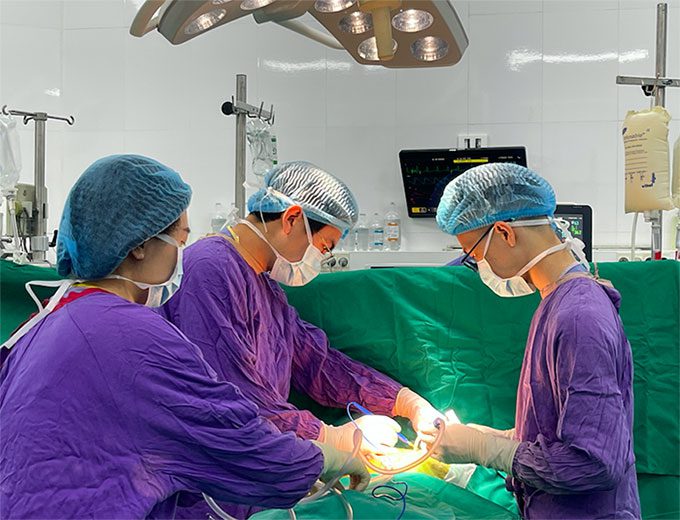The patient who received the transplant is a 37-year-old unmarried man suffering from severe heart disease and end-stage chronic kidney failure. He had no chance of survival without a heart and kidney transplant.
Mr. T.T.Q, 37 years old, hails from Gia Lai. He has been suffering from dilated cardiomyopathy, heart failure, and severe arrhythmia for the past 11 years, which led to a high risk of death and subsequent end-stage chronic kidney failure. For the last six years, he has undergone continuous dialysis three times a week. Due to acute tachycardia episodes, he frequently required emergency treatment at major cardiovascular centers in Ho Chi Minh City and Hue.
All medical treatments had failed, and a simultaneous heart and kidney transplant was the only option to sustain his life. Despite knowing the difficulty, Mr. Q. continued to seek hope.
In mid-2022, he was referred to Viet Duc Hospital in Hanoi. After a thorough assessment, the doctors recommended a simultaneous heart and kidney transplant using organs from a brain-dead donor.
At this leading surgical hospital in Vietnam, single organ transplants for the heart and kidney have become routine, but performing both transplants simultaneously remains a significant challenge.
Moreover, for over six months, there were no brain-dead organ donors that were suitable for Mr. Q. He continued to visit hospitals for heart failure treatment and dialysis.
In early February, a nearly 30-year-old female patient from Me Linh, Hanoi, who had suffered severe traumatic brain injury, was approved by her family to donate multiple organs.
“This multi-organ donation case has many special points,” said Prof. Dr. Tran Binh Giang, Director of Viet Duc Hospital, in a press conference on February 24. According to Prof. Giang, the donor’s younger brother had also suffered from severe cardiopulmonary disease and was on the transplant waiting list but did not have a suitable organ.
“Two months ago, the younger brother passed away. The patient’s family deeply understood the noble significance of organ donation to save lives. Therefore, when the unfortunate accident took the life of the sister, the family voluntarily agreed to donate organs to save other patients,” Prof. Giang explained.
However, due to the severe nature of the accident, some organs were injured, so the doctors assessed that they could only retrieve the right kidney and heart. Most importantly, all biological parameters were highly compatible with Mr. Q.

The multi-organ transplant took place over 10 hours. (Photo: BVCC).
The transplant lasted 10 hours on February 15, from 9 AM to 7 PM, involving doctors from five centers and clinical departments of the hospital. The team spent 3 hours retrieving the organs, 5 hours performing the heart transplant, and 2 hours for the kidney transplant.
Post-surgery, the condition was quite critical concerning the functions of the transplanted heart and kidney, but it was within the expected range and preparation of the hospital.
On February 24, eight days post-transplant, the functions of Mr. Q’s heart and kidney had nearly returned to normal. The patient was able to sit up, eat, and communicate without the need for special cardiovascular and respiratory support. He will continue to receive treatment for several weeks following the standard post-transplant protocols.
This is the first time Vietnamese doctors have successfully performed a simultaneous heart and kidney transplant on a single patient. Two years ago, Viet Duc Hospital successfully transplanted both liver and kidney simultaneously for a patient, who is now completely healthy. Hospital 103 previously performed a simultaneous pancreas-kidney transplant, and Hue Central Hospital has done heart-lung transplants. The technique for heart-kidney transplants is carried out in countries with advanced healthcare systems. For instance, the U.S. performs over 100 simultaneous heart-kidney transplants annually.
To date, Viet Duc Hospital has conducted over 1,500 organ transplants, leading the country. Prof. Giang mentioned that the hospital aims to perform multiple organ transplants simultaneously in the future.


















































